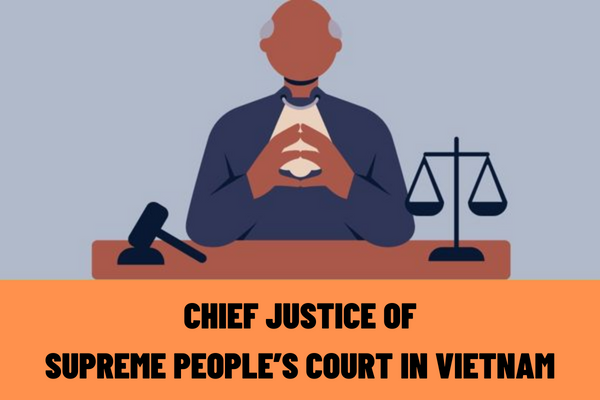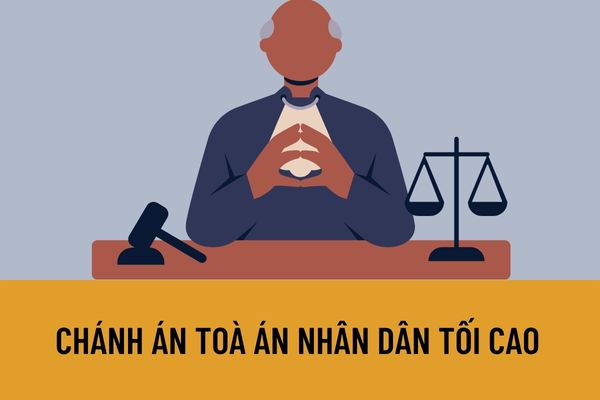What conditions must be met to become the Chief Justice of the Supreme People’s Court in Vietnam? By whom is the Chief Justice of the Supreme People’s Court elected?
By whom is the Chief Justice of the Supreme People’s Court elected?
Pursuant to Article 26 of the 2014 Law on Organization of People’s Courts in Vietnam stipulating as follows:
Chief Justice of the Supreme People’s Court
1. The Chief Justice of the Supreme People’s Court shall be elected, relieved from duty or dismissed by the National Assembly at the proposal of the President.
The term of office of the Chief Justice of the Supreme People’s Court must follow the term of the National Assembly.
2. Upon the expiration of the term of the National Assembly, the incumbent Chief Justice of the Supreme People’s Court shall continue to perform his/her duties until the National Assembly of the new legislature elects a new Chief Justice.
Thus, the Chief Justice of the Supreme People’s Court shall be elected, relieved from duty or dismissed by the National Assembly at the proposal of the President.

What conditions must be met to become the Chief Justice of the Supreme People’s Court in Vietnam? By whom is the Chief Justice of the Supreme People’s Court elected?
What are the criteria for becoming the Chief Justice of the Supreme People’s Court in Vietnam?
Pursuant to Section 2.16 of Regulation 214-QD/TW in 2020, the criteria for becoming the Chief Justice of the People’s Court are as follows:
- To fully ensure the general standards of a member of the Politburo, the Secretariat or a member of the Central Committee, and at the same time, it is necessary to have the following qualities and capabilities:
+ Having a high level and deep understanding of the Vietnamese legal system, international laws and practices;
+ Being qualified for the title of Judge of the Supreme People’s Court.
+ Having the capacity to concretize and organize the effective implementation of the Party's guidelines, guidelines and policies and the State's laws in the assigned fields;
+ Ability to make laws.
+ Experience in leading and directing activities of judicial agencies;
+ Fairness and objectivity in directing the adjudication work.
+ Having experienced and successfully completed tasks in the position of leaders, key managers at provincial level or leaders of central departments, ministries and branches.
+ Being an official member of the Central Committee for a full term or more.
In particular, the criteria for the title of Judge of the Supreme People’s Court are prescribed as follows:
Pursuant to Article 69 of the 2014 Law on Organization of People’s Courts in Vietnam and Article 67 of the 2014 Law on Organization of People’s Courts in Vietnam stipulating the conditions for appointment as judges of the Supreme People’s Court as follows:
- Must meet the Judge criteria as follows:
+ Being a Vietnamese citizen who is loyal to the Fatherland and the Constitution of the Socialist Republic of Vietnam, has good ethical qualities, firm political stance, courage and resolve to safeguard justice, and is incorrupt and honest.
+ Possessing a bachelor or higher degree in law.
+ Having been professionally trained in adjudication.
+ Having been engaged in practical legal work for a certain period of time.
+ Being physically fit to fulfill assigned duties.
- Must meet the above criteria and conditions for appointment of Judges of the Supreme People’s Court:
+ Having worked as a high-level judge for at least 5 full years;
+ Being capable of adjudicating cases and settling other matters under the jurisdiction of the Supreme People’s Court prescribed by the procedural law.
+ Persons who do not work in courts but hold important positions in central agencies or organizations, are deeply knowledgeable about politics, law, economics, culture, society, security, national defense and diplomacy;
Or leading legal experts or scientists, hold important positions in agencies or organizations, have high reputation in society, and are capable of adjudicating cases and settling other matters under the jurisdiction of the Supreme People’s Court prescribed by the procedural law may be selected and appointed as judges of the Supreme People’s Court.
What are the duties and powers of the Chief Justice of the Supreme People’s Court in Vietnam?
Pursuant to Article 27 of the 2014 Law on Organization of People’s Courts in Vietnam stipulating the duties and powers of the Chief Justice of the Supreme People’s Court as follows:
- To organize the adjudicating work of the Supreme People’s Court; to organize the implementation of the principle that judges and assessors shall conduct trials in an independent manner and obey only the law.
- To chair meetings of the Judicial Council of the Supreme People’s Court.
- To protest according to cassation or reopening procedure against legally effective judgments and decisions of people’s courts in accordance with the procedural law.
- To submit to the President his/her opinions on cases in which convicts apply for commutation of capital punishment.
- To direct the overall assessment of adjudicating practices; drafting and issuance of resolutions of the Judicial Council of the Supreme People’s Court to ensure the uniform application of law in trial; summarization, development and publicization of court precedents.
- To direct the drafting of laws, ordinances and resolutions to be submitted by the Supreme People’s Court to the National Assembly and National Assembly Standing Committee; to issue or jointly issue legal documents according to his/her competence in accordance with the Law on Promulgation of Legal Documents.
- To submit to the National Assembly for approval the appointment, relief from duty and dismissal of judges of the Supreme People’s Court; to propose the President to appoint, relieve from duty or dismiss Deputy Chief Justices of the Supreme People’s Court and judges of other courts.
- To appoint, relieve from duty or dismiss other staffs and other posts in the Supreme People’s Courts, except those under the competence of the President to appoint, relieve from duty or dismiss.
- To decide on rotation, transfer or secondment of judges, except judges of the Supreme People’s Court.
- To submit to the National Assembly Standing Committee for decision the establishment or dissolution of superior people’s courts; people’s courts of provinces and centrally run cities; people’s courts of rural districts, urban districts, towns, provincial cities and the equivalent; military courts of military zones and the equivalent; regional military courts; territorial jurisdiction of superior people’s courts and establishment of other specialized tribunals of people’s courts when finding it necessary.
- To submit to the National Assembly Standing Committee for approval the organizational structure, duties and powers of the assisting apparatus of the Supreme People’s Court.
- To decide on organization of specialized tribunals; to stipulate the organizational structure, duties and powers of units of the assisting apparatus of people’s courts.
- To perform the duties and exercise the powers as prescribed.
- To decide on allocation of payrolls, number of judges and budget funds for operation of people’s courts; to set payrolls of military courts after reaching agreement with the Minister of National Defense.
- To inspect the implementation of payrolls, management of staffs, management and use of budget funds and physical facilities of people’s courts.
- To organize the training and retraining of judges and assessors and other staffs of people’s courts.
- To be answerable and report his/her work to the National Assembly; when the National Assembly is in recess, to be answerable and report his/her work to the National Assembly Standing Committee and President; to answer questions and respond to recommendations of National Assembly deputies.
- To perform the duties and exercise the powers prescribed in the procedural law; to settle other matters in accordance with law.
LawNet
